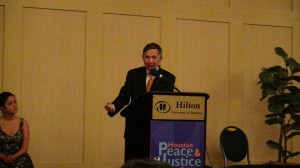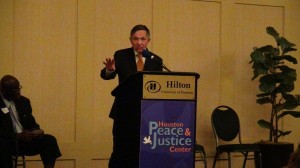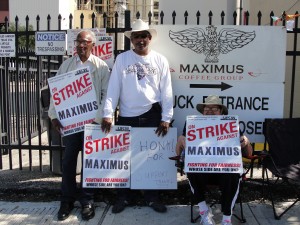October 30, 2013
The War in Iraq: an Assessment
by W.T. Whitney Jr.
Argentinean political commentator Juan Gelman thinks the Iraq war has “entered into perfect forgetfulness,†at least in the United States. He implies U.S. leaders enjoy impunity, despite having lied to rationalize their invasion and despite civilian deaths from their war. Memory may indeed be at fault, but maybe what’s happening is that not all U.S. Americans know. Perhaps their politicians prefer not to know.
Media coverage of the Iraqi disaster has been sporadic and never comprehensive. Yet that may be changing. Recent initiatives promise easy access to basic information. The contention here is that knowing what has happened in Iraq is essential for awareness of crimes there and for establishing guilt.
A study released on October 15 shows, for example, that the Iraqi death rate between 2003 and 2011 was 4.55 per 1,000 person-years, a figure 50 percent higher than rates for two years immediately preceding the war. That means 405,000 excess wartime deaths. As of 2005 – 2006, the risk of death had risen 70 percent for women, 290 percent for men. According to the study published by PLOSMedicine, violence accounted for 60% of excess deaths with the remainder caused by “the collapse of infrastructure and other indirect, but war-related, causes.†PLOS, the online journal’s publisher, is an “organization of scientists and physicians committed to making the world’s scientific and medical literature a freely available public resource.â€
Having surveyed 2000 randomly selected households in 100 geographic areas, the researchers claim improved methodology over earlier studies of civilian deaths. Commentator Juan Cole linked their results to the 500,000 excess Iraqi deaths in the 1990’s, when U.S. economic sanctions prevailed. Victims were mostly children. “The US polished off about a million Iraqis from 1991 through 2011,†he charges.
In another development, Agence France-Presse (AFP) has streamlined access to mortality summaries and thereby eased the monitoring of data. An announcement explained that “AFP’s internal spreadsheet tracking daily casualties from attacks in Iraq†is open to the public. The news service expects the “incredibly time-consuming and opaque†process of verifying death reports will become obsolete. The spreadsheet for each month has links to “other sheets for violence tracking†beginning with August 2012. Government figures are available for comparison. To see the AFP spreadsheet, go to http://www.bit.ly/AFPIraqToll.
Knowing the extent of social disruption caused by the war is basic to understanding the U.S. role in the calamity. Social and environmental chaos set the stage for civilian deaths and suffering.
By 2007 Iraqi orphans numbered 5 million. As of March, 2013, 2.7 million Iraqis were internally displaced, 83 percent of them women and children. Also, 33 percent of women received no humanitarian assistance after 2003, 76 percent of widows receive no pension, and 55 percent of women suffered violent abuse. The U.S. invasion and occupation caused destruction of sewage treatment plants, factories, schools, hospitals and power plants. Public health infrastructure is minimal, 70 percent of Iraqis lack access to potable water, food is short for 4 million people, and sanitation is inadequate for 80 percent of Iraqis.
And sectarian civil war, fostered by a U.S. strategy of divide and rule, contributed mightily to social disintegration. Soldiers and paramilitaries killed civilians. U. S. troops and sectarian militias accounted for an equal number of violent deaths.
Evidence is strong that environmental contamination from left-over weapons and munitions endangered civilians. The debris contains depleted uranium (DU), which many think causes birth defects and cancers. Birth defects are concentrated in areas of heavy fighting, notably Fallujah and Basra. An epidemiological study released on September 11 has returned that epidemic to the news, but for perverse reasons.
Having conducted household interviews, the Iraqi Ministry of Health discovered that 21.7 infants per 1,000 births were born with congenital defects – normal findings, it was suggested. There was “no clear evidence to suggest an unusually high rate of congenital birth defects in Iraq,†according to the research. The epidemic never happened.
Protests from scientists and humanitarian specialists flooded left-leaning media outlets. Some 50,000 people signed a Change.org petition calling for expert review of the study data and methods. For Neel Mani, a former WHO program director in Iraq, the study “runs counter to the consistent reports of medical professionals across Iraq.†He suspects politicization of the research,â€
Studies show that: from 2006 through 2009, Fallujah experienced a twelve fold rise in childhood cancer and a rise in infant mortality at least four times regional norms; in Fallujah, from 2003 through 2010, congenital malformations increased to 15% of all births; and in Basra during 10 years following the 1991 Gulf War congenital defects affecting babies born in one maternity hospital increased 17 – fold. That trend continued: physicians at that hospital recently described “a 60% rise in birth defects since 2003.†Researchers cast blame on depleted uranium and other metallic residues.
Britain’s Lancet medical journal questioned the report’s methodology and peer review.†For Finnish environmentalist Keith Baverstock, a specialist on DU health effects, “This document is not of scientific quality. It wouldn’t pass peer review in one of the worst journals.†“Existing medical records in Iraqi hospitals†were ignored and “interviews with mothers [were used] as a basis for diagnosis.â€
Former UN assistant secretary general Hans von Sponeck, formerly UN humanitarian coordinator for Iraq, indicated evidence for the “alarming rise in birth defects, leukemia, cancer and other carcinogenic diseases in Iraq [was] definitive.†He suggested “someone, somewhere clumsily decided that they would not release these damning findings, but instead obscure them.†Baverstock questions “the role of the US and UK, who have a conflict of interest in this sort of study due to compensation issues that might arise from findings determining a link between higher birth defects and DU.â€
The conclusion here is that crimes were committed and cover-up continues. After all, the Geneva Conventions require combatants to protect civilians during wars. And, U.S. guilt is clear. The U.S. military, its contractors, and other U.S agents created an environment dangerous to civilians. And, U.S. officials lied to start the war.
Agencies for judgment and enforcement are in short supply. The United States denies obligations under the International Criminal Court. Any action by the United Nations Security Council requires U.S. approval. But there is a remedy, one based on dual assumptions: U.S. involvement in Iraq joins a long series of military interventions abroad, and that’s what empires do. So obtaining justice requires joining the anti-imperialist cause and the people’s movement that is its substance. Easy to say, yes, and early victories are unlikely, but what else is there?
http://www.counterpunch.org/2013/10/30/the-war-in-iraq-an-assessment/
*********************************
Cuba gains crushing UN victory over United States, again
W. T. Whitney Jr.
The United Nations General Assembly on October 29 approved a Cuban resolution calling upon the United States to end its economic, commercial, and financial blockade. The General Assembly has backed such a resolution every year since the non- enforceable resolution was first introduced in 1992. In preparing for the vote, the Cuban Foreign Ministry creates an annual report demonstrating cruelty and illegality ongoing for half a century.
This year 188 nations said “yes†to the Cuban resolution, Israel and the United States opposed, and Micronesia, Marshall Islands and Palau abstained. A pattern of overwhelming majority votes began with 167 affirmative votes in 2000 culminating with 188 majority votes in 2012. The United States and Israel have opposed the resolution consistently.
In the Assembly debate prior to the vote, Cuban Foreign Minister Bruno Rodriguez assured delegates that, “The human damages caused by the …blockade imposed by the United States are incalculable.†Delegates of ten nations defended the Cuban resolution. U.S. delegate Ronald Godard opined that Cuba “still has one of the most restrictive economic systems in the world.”
Cuba’s yearly submission of the resolution creates an opportunity to register worldwide loathing of U.S. policies directed at Cuba. Additionally, Cuba uses the report delivered to voting nations to demonstrate adverse blockade effects on people’s lives, Cuban national sovereignty, and economic sustainability. The report conveys crucial information on the centerpiece of U.S. anti-Cuban hostility. An English language version circulates on the internet.
Deputy foreign minister Abelardo Moreno presented the detailed, comprehensive report on October 7 at a press conference at the William Soler Pediatric Cardiology Center in Havana. Blockade – related shortages of essential surgical and medical materials have long burdened patients, families, and physicians at that flagship hospital.
Certain categories of abuses outlined in document are worthy of note. For example, monetary loss at U.S. hands totals $1,157,327,000,000 dollars (taking into account dollar depreciation). Figured into the amount are violations of Cuban patents, confiscation of Cuban funds abroad, losses from missed sales of products subjected to the blockade, losses of humanitarian assistance funds waylaid en route to Cuba, high costs from having to re-route imports blocked under U.S. rules through third countries, losses from interference with the tourist industry, losses from business contracts unfulfilled when foreign partners withdraw under U.S. pressures, and losses associated with U.S. purchases of foreign companies.
Foreign banks and other financial institutions face U.S. fines following accusations of handling dollars as part of transactions involving Cuban businesses, agencies, and citizens. U.S. identification of Cuba as a “terrorist†state serves as pretext. Fearful of losing U.S. business, targeted institutions often respond by permanently giving up relations with Cuba. As a result, difficulties mount for Cuba in securing international loans and foreign investment, receiving foreign donations, and pursuing normal overseas commerce.
Special targeting of Cuba’s health care sector, in place for many years, continues. Multi-national drug manufacturers and medical equipment merchandisers pay big fines on U.S. discovery that medical devices or drugs sold by their subsidiaries to Cuba contain 10 percent or more of components originating from the United States. They usually drop Cuba as a customer. Clinical care centers, notably intensive care units, either go without crucial supplies or secure them expensively through third parties. Equipment available only in the United States is off limits for many critically ill patients. Medical imaging equipment is immobilized because essential computerized control systems require prompt authorization from Microsoft Corporation, The blockade usually makes that impossible.
The Cuban report instructs U.S. citizens on the nature of their government. They learn that despite United Nations founding principles, the idea of national sovereignty may be trashed. They learn their government endangers innocent people, despite international law.
“Because of its declared purpose,†the report says, “the political, legal and administrative framework on which the blockade rests qualifies as an act of genocide by virtue of the Geneva Convention of 1948.†The United States has imposed “the most unjust, severe and extended system of unilateral sanctions ever enforced against any country.â€
That “declared purpose†has been evident ever since the release of an internal State Department memorandum in 1960. Author Lester Mallory observed that “The majority of Cubans support Castro … The only foreseeable means of alienating internal support is through disenchantment and disaffection based on economic dissatisfaction and hardship.†He proposed action which “makes the greatest inroads in denying money and supplies to Cuba, to decrease monetary and real wages, to bring about hunger, desperation and overthrow of government.â€
Awareness of such cruelty and illegality has long fueled resistance by a U.S. solidarity movement. Cuba’s annual reports provide documentation essential for the purpose of sustaining that political campaign.
The contemporary relevance of the report this year is evident from the statement that “Damages done by the blockade to Cuban foreign trade amount to $3,921,725,790, a figure 10 percent above that of last year.†Significantly, “The last five years have witnessed a persistent tightening of the economic, commercial and financial blockade of the United States Government against Cuba, particularly of its extraterritorial dimension.â€
http://www.peoplesworld.org/cuba-gains-un-victory-over-u-s/
*****************
War zone extends to Colombian prisons
W. T. Whitney Jr.
For Colombian governments fighting a civil war, prisons are a tool of repression. Solidarity events for Colombia’s 9,000 political prisoners took place in October, 2013. Organizers maintain Colombia is rife with “social and political violence where social protest is repressed and criminalized.†Critic Azalea Robles reports 90 percent of political prisoners “are civilians jailed through their political activity … unionists, environmentalists, teachers, agrarian leaders, academic critics … and defenders of human rights.
Negotiators at peace talks in Cuba between the government and the Revolutionary Armed Forces of Colombia (FARC) are discussing political prisoners as part of their current agenda item, which is political participation. The imprisonment of two high profile veterans in the fight for agrarian and human rights illustrates the connection between arbitrary incarcerations and conditions of internal war.
David Ravelo led the political fight In the Barrancabermeja area against violent paramilitaries hired by big landowners and other wealthy interests to remove small farmers from land they were seeking. Having entered prison on September 14, 2010, he is serving an 18 – year sentence on false charges of participating in a 1991 murder. Huber Ballesteros is vice president of the Fensuagro labor federation, Colombia’s largest farm workers’ union. His arrest on August 25, 2013 came early during the course of a nationwide National Agrarian Strike for which he was a spokesperson.
Ravelo’s conviction rested on an accusation made by a jailed paramilitary chieftain in return for a shortened sentence. Ravelo’s appeal focuses on a crime committed by his prosecutor in 1991. William Pacheco Granados, a police lieutenant then, participated in the forced disappearance of an individual. The Colombian military jailed him for the crime. Ravelo’s lawyers now cite laws barring criminals from serving as prosecutor. Yet Pacheco Granados is still on the job.
Ravelo has received awards for defending human rights. International unions, United Nations officials, U.K lawyers and parliamentarian, and human rights groups have protested judicial irregularities in his case and demanded his release. International delegations have visited him in prison.
At a large gathering in Bogota on the third anniversary of Ravelo’s arrest, speakers praised Ravelo’s dedication to “Colombia’s poor and humble†and his leadership of the Credhos human rights group. Voz newspaper director Carlos Lozano honored Ravelo as “a distinguished leader of the Communist Party,†who, along with those he defended, faced “dungeons, intimidations, displacements, and death threats.â€
Ravelo fought on behalf of Colombians displaced from land. On a recent solidarity visit to Catatumbo Department, U.S. lawyer Dan Kovalik heard testimony describing rural terror attacks at the hands of soldiers and paramilitaries who enforce corporate land takeovers. The Colombian military; police; prison construction projects; and, indirectly, paramilitaries all benefit from U.S. funding.
Huber Ballesteros faces charges of rebellion and supporting terrorists. In addition to his participation with the Fensuagro union, Ballesteros is a leader of the Patriotic March coalition movement, also part of the agrarian reform movement. An international solidarity campaign is demanding Ballesteros’ freedom.
Hyper – concentration of land has fueled the FARC’s insurgency since it’s beginning in 1964, and the first agenda item of the Havana peace talks was agrarian rights. Although negotiators reached agreement on land issues several months ago, the arrest of Huber Ballesteros during the agrarian strike strongly suggests struggles over land are not over. That’s the impression gained also from sentences handed down recently to three other jailed Fensuagro leaders.
Ballesteros’ political participation has moved now to inside prison. He wrote the article “Privatization of justice and merchandizing of prisons†that appeared in early October. “To palliate its grave situation,†he observed, “the crisis – ridden capitalist system uses the economic model of neo-liberalism to penetrate every sphere of society.†The Colombian government “enacted laws that privatized the justice [system] and converted prisons into commercial establishments.†Ballesteros condemns “creation of new crimes with the purpose of overfilling prisons and [thereby] generating new ‘clients’ for private investment.†He objects to “implementation of North American methods of justice, prisons, and prison operations.â€
Ballesteros’ concern is for all prisoners in Colombia. “In this dance of the millions,†he states, “we on the inside are the ones hurting. We suffer from corruption at all levels.†The fallout, one observer explains, includes prisoner deaths due to bad quality medical care, rotten or contaminated food, and beatings. The prison population is up 30 percent over three years. Some 40,000 people are in prison without benefit of a trial.
The cases of Ravelo and Ballesteros are equivalent to a laboratory demonstration on skewed political participation. The two prisoners intervened in a class-divided society to defend victims of land- hungry corporations and oligarchs. And Ballesteros spoke up for masses of prisoners in the grasp of latter-day slave masters and their drivers.
http://www.peoplesworld.org/war-zone-extends-to-colombian-prisons/














